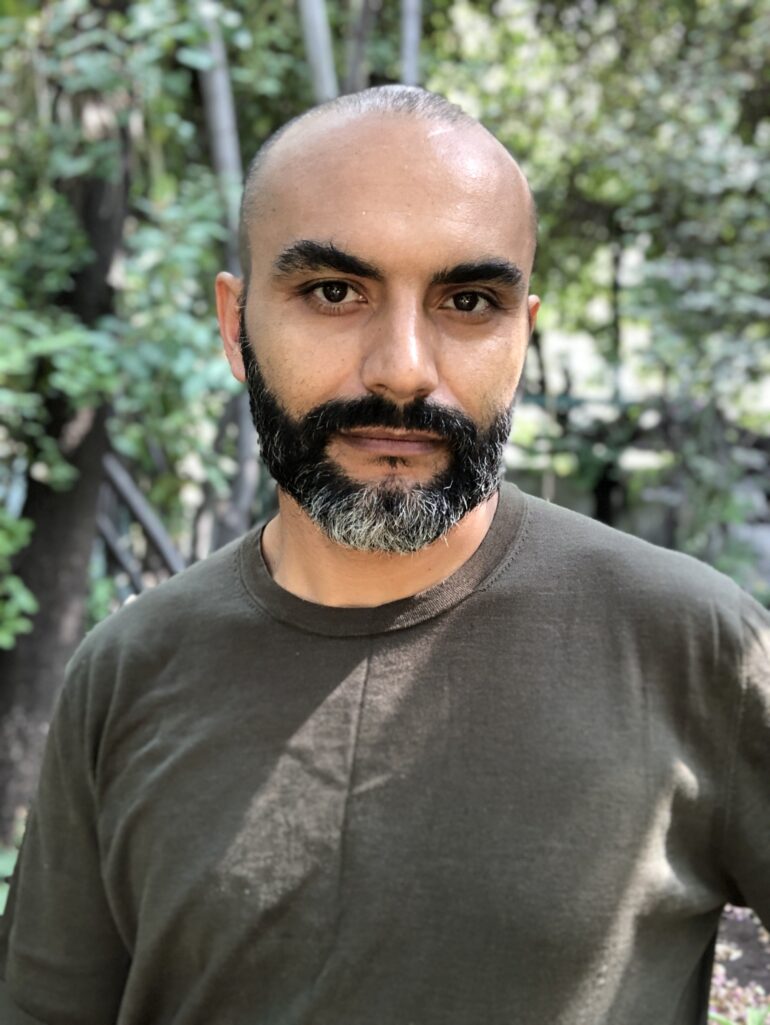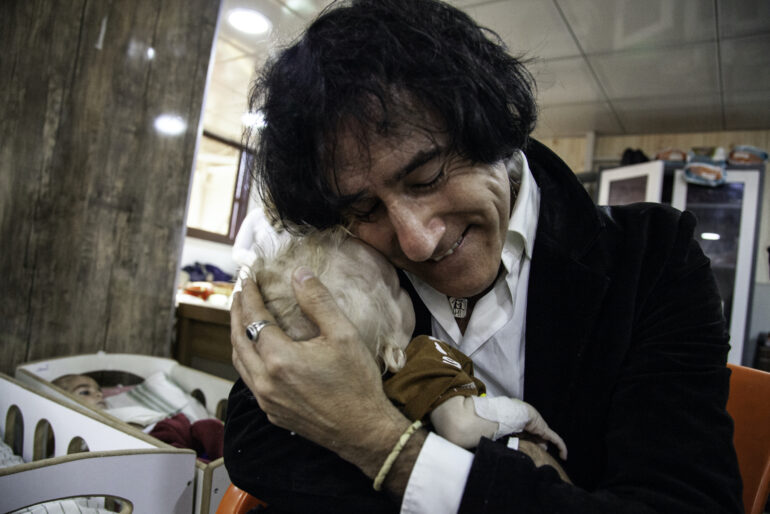WRITTEN BY: Annika Pham
The Swedish film screening as a world premiere at the DOX:Award programme is produced by Cinenic Film with support from Nordisk Film & TV Fond.
A film graduate from Valand Academy in Göteborg, Chilean-Swedish director Gorki Glaser-Müller has experimented with various forms of storytelling.
His short film Girl with a Video Camera
travelled to several festivals. His feature film debut Once a Year (2014) earned Gunilla Röör a nomination for Best Actress at the Guldbagge Awards 2014. Children of the Enemy is his documentary feature-length debut.
The film Children of the Enemy world premiering at CPH:DOX, chronicles the endeavour of Gothenburg-based Chilean/Swedish Patricio Galvez to repatriate his seven orphaned grandchildren, trapped in a Syrian camp, after both their parents - including Galvez’s ISIS recruited-daughter Amanda, died as jihadists.
The charismatic 50-year-old takes on the difficult task of trying to get help from the Swedish authorities, reluctant to touch the controversial topic of former ISIS children.
While waiting for the situation to unblock in Northern Iraq, under the scrutiny of international media outlets, Galvez shares moments of grief, anxiety and joy, determined to save his grandchildren aged 1-8.
The film was produced by Erika Malmgren and Kristofer Henell at Cinenic Film, with co-production partners Toolbox Film, GGM Film, One Night Picture, Film I Väst, SVT. It received co-financing from DR, NRK, Yle, and support form the Swedish Film Institute, The Danish Film Institute, Nordisk Film & TV Fond, Göteborgs Stads Kulturnämnd, the Doha Film Institute and The Malik Bendjelloul Memorial Foundation. TriArt will handle the domestic distribution.
How long have you known the main protagonist Patricio Galvez? You obviously share the same Chilean origin which creates special bonds, and was it his or your idea to make the film?
Gorki Glaser-Müller: I’ve known Patricio 15-17 years. We have common friends in music, and I made video clips for Patricio’s band LecheBurre. Regarding the background for the story, I knew his daughter had converted to Islam, but it was problematic for Patricio. He didn’t want to go into the subject. I could understand it. A bohemian musician, a true pacifist, not religious…it must have been tough. I once saw his daughter in the street, who was wearing the full abaya. When she joined ISIS in secret, he kept quiet. When he eventually told me, it was because he wanted me to do this film. He was determined to go to the camp in Syria to get his grandchildren back. As a filmmaker, I felt this was an urgent story to tell. I immediately started filming him at home, doing phone calls and meeting people. I was thrown into the turmoil. It was in the spring 2019.
From the outset, Patricio comes out as a charismatic protagonist with a larger-than-life personality, and his determination is perhaps the main reason for the success of his mission…
GGM: Yes his story is very much one of David vs Goliath, of a small man fighting against the political system, as he tries to convince the Swedish authorities to help him in his endeavour. For a Swede with Chilean roots, he had to fight twice as hard as people kept questioning his real purpose, who he was. But he was tenacious and never gave up. Between us the joke was: he’s a hard-headed bast..d. That actually helped!
How was your experience of travelling all the way to northern Iraq and Syria with Patricio, although just like him, you had little knowledge of Middle-Eastern politics and no experience either of working in conflict zones?
GGM: It was terrifying as a filmmaker to have to go to there, an unknown area, with little time to do any research and prepare. I had no time to decide what cable, what camera to bring. I took the minimum equipment, but still had to plan for the worse. I was the only one filming, doing the sound, following Patricio’s every step. I must say the whole experience there was nerve-racking.
What were the biggest challenges during filming and after in the editing room?
GGM: Not knowing what would happen and when, was very difficult in Iraq and Syria. I just kept filming all the time, not to miss anything. Once in the editing room, the complexity was to keep the story to the core: Patricio’s negotiations with the Swedish authorities to get the kids back home.
There were so many side-stories, some really interesting that we left out, for instance the story of mercenaries who got in touch with Patricio and offered him their services. It felt like in the film Casablanca! We had four editors working on the film [Søren B. Ebbe, Erika Gonzales, Kasper Laick and Åsa Mossberg] and we used Rough Cut Services.
Another challenge for me on a personal level, was coming back to Sweden and adjusting to ‘normal’ life. Over there, I was able to deal with super stressful situations, always on the edge. It took a while to settle emotionally once in Sweden.
A turning point in the film is when Patricio understands that to put pressure on the Swedish authorities, he needs the media. His every step in his hotel headquarters in Iraq is then followed by all possible media outlets. How was it for you to shoot your own film under those circumstance and what views did you have of the media frenzy?
GGM: It interfered as I had to then double the material-film with the media, film without the media. It was just impossible to avoid. There was at least one camera crew a day filming him. For me it was very interesting. I got a glimpse of how journalists work in war zones, a deeper understanding and respect for them, but also for all the aid workers, nurses, and doctors who constantly put their lives at stake.
Patricio tries to understand how he lost his daughter to ISIS, with whom he had a strong connection. The film is also about his grieving process...
GGM: Patricio understood quite late that she had left to join ISIS. He tried hard to convince her to give herself to the Kurdish authorities, to no avail. He tried all along to keep in touch with his grandchildren.
But yes, he did have a special relationship with his daughter, and he still believes that had she not been killed, eventually he would have been able to win her back. Ultimately, the extreme pain and sorrow of having lost his daughter twice - once to ISIS, then when she was killed, is the driving force to his mission to save his grand-children: he wants to make sure that won’t happen again.
Has Patricio’s ability to rescue his grandchildren impacted the fate of children of ISIS former recruits? Do you hope the film will bring some changes?
GGM: The film is important to all children in the same situation, who must be protected under the Convention on the Rights of the Child. There are still at least 30 Swedish kids from former ISIS fighters in the camps and thousands from other countries waiting to be repatriated. We’ve formed an NGO called ‘Repatriate the Children’. The battle must continue.
Oscar-winning producer John Battsek [One Day in September, Searching for Sugarman] is credited as executive producer. How did you meet and what was his input?
GGM: We met at an early stage, through the Malik Bendjelloul Memorial Foundation. Our first meeting was very demanding. He said "OK, your story is compelling, but you still might not make it to the top festivals. You need to work hard!” Meeting someone like him, with so much experience helped us and inspired us.
What’s next for you?
GGM: I’m working on a fiction film, based on real events, about Chilean kids from mothers who were raped under the Pinochet dictatorship, then sent for adoption in Sweden. It will be told as a thriller. I’m in the development stage.

